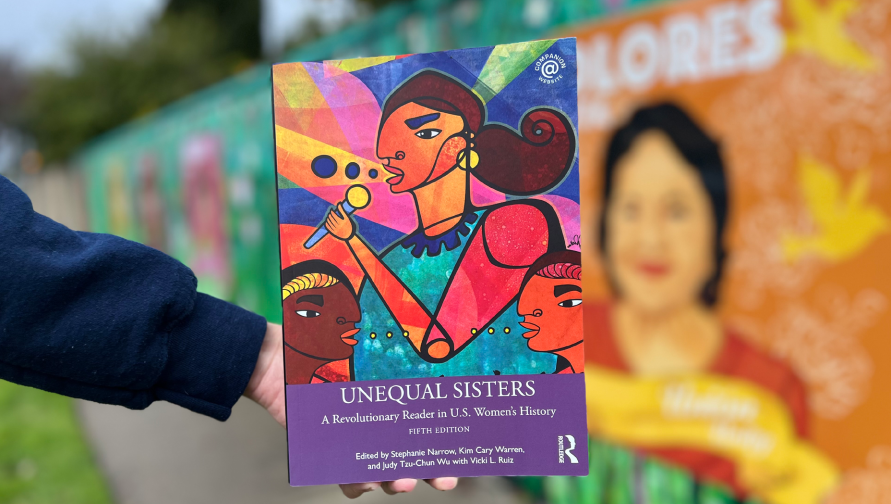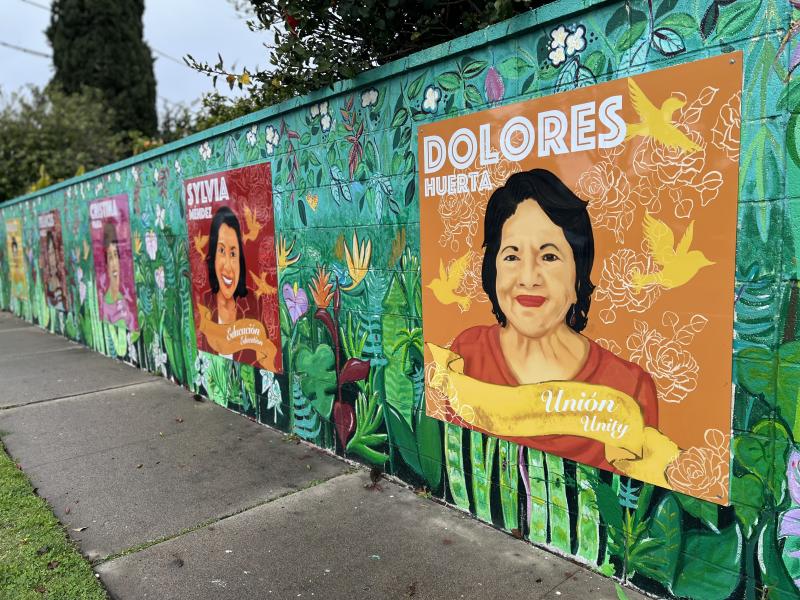
By Stephanie Narrow, Ph.D.
I remember sitting at my desk in Spring 2021, blinking back tears of gratitude as I absorbed the news: the co-editors of Unequal Sisters: A Revolutionary Reader is U.S. Women’s History (Routledge, 2023) — the ground-breaking anthology series on U.S. women’s history — invited me to join them as co-editor of the fifth edition. Me, a fourth-year history Ph.D. candidate who had been working as a research assistant for Judy Tzu-Chun Wu, professor of history and Asian American studies at UCI. Wu was co-editing the volume alongside Vicki L. Ruiz, Distinguished Professor of history at UCI, and Kim Cary Warren, associate professor of history at the University of Kansas.
And I also remember, just three years prior to that, reading and learning from Unequal Sisters during my first-year coursework at UCI – encountering scholarship that challenged my conceptions of feminism, resistance and belonging.
Over thirty years after the publication of the first edition of Unequal Sisters, the latest volume continues to inspire the next generation of scholars. The framing of the fifth edition as a “revolutionary” reader is inspired by the previous volumes’ centering of “inclusive” and “multicultural” histories. The central themes of this newest iteration — agency and activism, body politics and kinship and family — are interwoven throughout every aspect of Unequal Sisters. From the formation of its intergenerational editorial contributors, to the concerted decision to spotlight the work of women of color and scholar-activists, to the selection of its cover art, Unequal Sisters truly embodies the inherent power of collaborative and diverse forms of community-centered scholarship.
Intertwining the personal, professional and political
The focus on community is central to how Ruiz, co-founding editor of the anthology, understands intersectional feminism. “For me, feminism isn't about, ‘I am woman, hear me roar,’” she contends. Rather, Ruiz asserts that “when you disconnect gender rights from the train of social justice, to me it's not feminism anymore. That there has to be the community. It has to be community-centered feminism.”
It was important that the cover art of Unequal Sisters reflected these core values of intergenerational solidarities and the impactful work of women of color activists and intellectuals in the academy — and beyond. My co-editors and I are honored to feature the work of Favianna Rodriguez, an Oakland-based artist and activist whose art addresses the fight for gender justice, racial equity and sexual freedom. Her piece, “Voices Are Power,” was inspired by a feminist gathering she attended in Lima, Peru, and depicts empowered Afro-Latina women “speaking out and claiming space.”

This entwining of the personal, professional and political also informed the work of Dorothy Fujita-Rony, associate professor of Asian American studies at UCI. As a second-generation Indonesian American, she reflects that she “grew up listening to family stories and always knew they were an incredible resource.” This emphasis on oral family histories shaped her book The Memorykeepers: Gendered Knowledges, Empires, and Indonesian American History (Brill, 2021), the first chapter of which is featured in Unequal Sisters. Fujita-Rony’s work, too, foregrounds multigenerational and multicultural scholarship and community, and emphasizes the need for inclusivity. She insists that “we also need to value the gendered ways that women engage in memory keeping, [which] not only connects us through time, but through space as well, across the continents and across the oceans. We also have to push past national frameworks to understand people's worldviews.”
A University of California story
But Unequal Sisters isn’t just a UC Irvine story. It is a celebration of several dynamic University of California scholars. This most recent edition builds upon the legacy work of two distinguished University of California historians, Vicki L. Ruiz (UC Irvine) and Ellen Carol Dubois (UCLA). Their collaboration on the 1990 first edition of Unequal Sisters remains a seminal work of feminist history, highlighting the intersections of race and gender and centering the impactful work of women of color in shaping U.S. history.
And now, the latest edition of Unequal Sisters continues to uplift the work of feminist scholars at the University of California, including Cecilia Tsu, associate professor of history at UC Davis. Tsu’s article on gender relations in Japanese immigrant communities emphasizes what she describes as “the agency and power of everyday women.” Fighting against both gender biases and xenophobia in early 20th-century California, Tsu’s work reveals that these immigrant women found unique opportunities to exercise “moments of agency” as they navigated life in a new world. Also featured is former UC President’s Postdoctoral Fellow Holly Miowak Guise, whose public-facing work on Alaska Native veterans is molded, too, by her own lived experiences as an Iñupiaq scholar.
Luisa Moreno, the subject of Vicki Ruiz’s article in Unequal Sisters, reflected in a 1925 newspaper article on the intergenerational legacies of Latina feminist traditions. A path-breaking feminist intellectual, Moreno wrote that, "if we kept searching, we could find an extensive list of audacious and determined feminists...We could see them planting seeds on stone, seeds that today flourished, and will tomorrow give the world the sweetness of its most perfect fruit." Unequal Sisters first planted those seeds of intersectional feminist discourse in 1990. Now, over thirty years later, and nearly 100 years after Moreno’s inspirational reflections, I am honored to have toiled alongside Vicki, Kim and Judy, and cultivating this latest edition for the next generation of audacious and determined scholar-activists.
Holding the physical copy of the anthology upon its publication in October 2023, less than a month after earning my Ph.D., tears of pride and humility again limned my eyes. Reflecting on the full-circle moment, I relish in the serendipitous irony in that bringing me onto this project, Judy, Kim and Vicki had considered me not as a student, but a colleague. An “equal” sister.
About Stephanie Narrow
Stephanie Narrow earned her Ph.D. in History from the University of California, Irvine in 2023. She is currently a Project Manager at TalentCompass.
Interested in reading more from the School of Humanities? Sign up for our monthly newsletter.
(Cover image: Stephanie Narrow)
